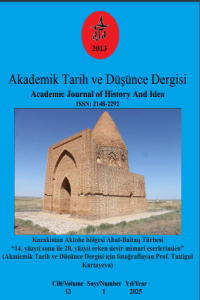Abstract
Tacik felsefesi, 20.-21. yüzyıllarda önemli dönüşümler geçirmiş, kadim geleneklerle modern entelektüel eğilimlerin eşsiz bir bileşimidir. Makale, Ceditçi hareket ve Sovyet döneminden başlayarak, ulusal geleneklere dönüş ve dünya felsefe camiasıyla etkileşim de dahil olmak üzere Sovyet sonrası evrime kadar gelişiminin kilit aşamalarını incelemektedir. İslam felsefesi, Sufizm ve İbn Sina ve Nasır Hüsrev gibi seçkin düşünürlerin mirasının etkisine özellikle dikkat edilmektedir. Batılı felsefi kavramların etkisi ve küreselleşme bağlamında yeni bir felsefi paradigmanın oluşumu analiz edilmektedir.
References
- Ahmadi, M. (2016). Contemporary Iranian Philosophy: Tradition and Modernity. Tehran University Press.
- Fry, R. N. (2000). The Heritage of Central Asia: From Antiquity to the Turkic Invasion. Irfon. Khaidarov, A. (2001). Philosophy and Society. Maorif.
- Gafurov, B. G. (1989). History of the Tajik people. Irfon.
- Ivanov, P. L. (2010). Philosophical Traditions of Central Asia. Nauka.
- Kuznetsov, V. N. (2012). International cooperation in science and education between Tajikistan and Russia. St. St. Petersburg State University Publishing House.
- Leonov, A. V. (2017). Tajik philosophy in the context of globalization. Siberian scientific publishing house.
- Masov, R. M. (2008). Tajiks: History of a National Tragedy. Irfon.
- Mirzoev, G. J. (2019). Islam in the Context of Public Consciousness of Tajiks: History and Modernity. Maorif.
- Nikolaev, S. P. (2014). Philosophy in Post-Soviet Kazakhstan: The Search for Identity. Kazakh University.
- Petrov, I. A. (2015). Philosophy of Kazakhstan: Traditions and Modernity. Eurasian National University.
- Pirumshoev, A. K., & Malikov, M. S. (2009). History of philosophical thought in Tajikistan. Donish.
- Rakhmatova, Z. Yu. & Sadiev, Sh. S. (2019). History of the Tajik people: A textbook. Maorif.
- Rakhmonov, E. Sh. (1999). Religious processes in Tajikistan at the end of the 20th century. Irfon.
- Sidorov, A. V. (2018). Intercultural Dialogue in Philosophy: The Experience of Tajikistan and Russia. Progress.
History of Tajik Philosophy in the Context of Social and Cultural Transformation of the 20th–21st Centuries
Abstract
Tajik philosophy is a unique combination of ancient traditions and modern intellectual trends, having undergone significant transformations in the 20th–21st centuries. The article examines the key stages of its development, starting with the Jadidist movement and the Soviet period, to the post-Soviet evolution, including a return to national traditions and interaction with the world philosophical community. Particular attention is paid to the influence of Islamic philosophy, Sufism and the legacy of such outstanding thinkers as Ibn Sina and Nasir Khusrow. The influence of Western philosophical concepts and the formation of a new philosophical paradigm in the context of globalization are analyzed.
References
- Ahmadi, M. (2016). Contemporary Iranian Philosophy: Tradition and Modernity. Tehran University Press.
- Fry, R. N. (2000). The Heritage of Central Asia: From Antiquity to the Turkic Invasion. Irfon. Khaidarov, A. (2001). Philosophy and Society. Maorif.
- Gafurov, B. G. (1989). History of the Tajik people. Irfon.
- Ivanov, P. L. (2010). Philosophical Traditions of Central Asia. Nauka.
- Kuznetsov, V. N. (2012). International cooperation in science and education between Tajikistan and Russia. St. St. Petersburg State University Publishing House.
- Leonov, A. V. (2017). Tajik philosophy in the context of globalization. Siberian scientific publishing house.
- Masov, R. M. (2008). Tajiks: History of a National Tragedy. Irfon.
- Mirzoev, G. J. (2019). Islam in the Context of Public Consciousness of Tajiks: History and Modernity. Maorif.
- Nikolaev, S. P. (2014). Philosophy in Post-Soviet Kazakhstan: The Search for Identity. Kazakh University.
- Petrov, I. A. (2015). Philosophy of Kazakhstan: Traditions and Modernity. Eurasian National University.
- Pirumshoev, A. K., & Malikov, M. S. (2009). History of philosophical thought in Tajikistan. Donish.
- Rakhmatova, Z. Yu. & Sadiev, Sh. S. (2019). History of the Tajik people: A textbook. Maorif.
- Rakhmonov, E. Sh. (1999). Religious processes in Tajikistan at the end of the 20th century. Irfon.
- Sidorov, A. V. (2018). Intercultural Dialogue in Philosophy: The Experience of Tajikistan and Russia. Progress.
Details
| Primary Language | English |
|---|---|
| Subjects | 21st Century Philosophy |
| Journal Section | Articles |
| Authors | |
| Early Pub Date | February 23, 2025 |
| Publication Date | April 8, 2025 |
| Submission Date | December 30, 2024 |
| Acceptance Date | January 25, 2025 |
| Published in Issue | Year 2025 Volume: 12 Issue: 1 |
По всем вопросам приема статей и выпуска очередных номеров обращаться в редакцию соответствующего журнала


